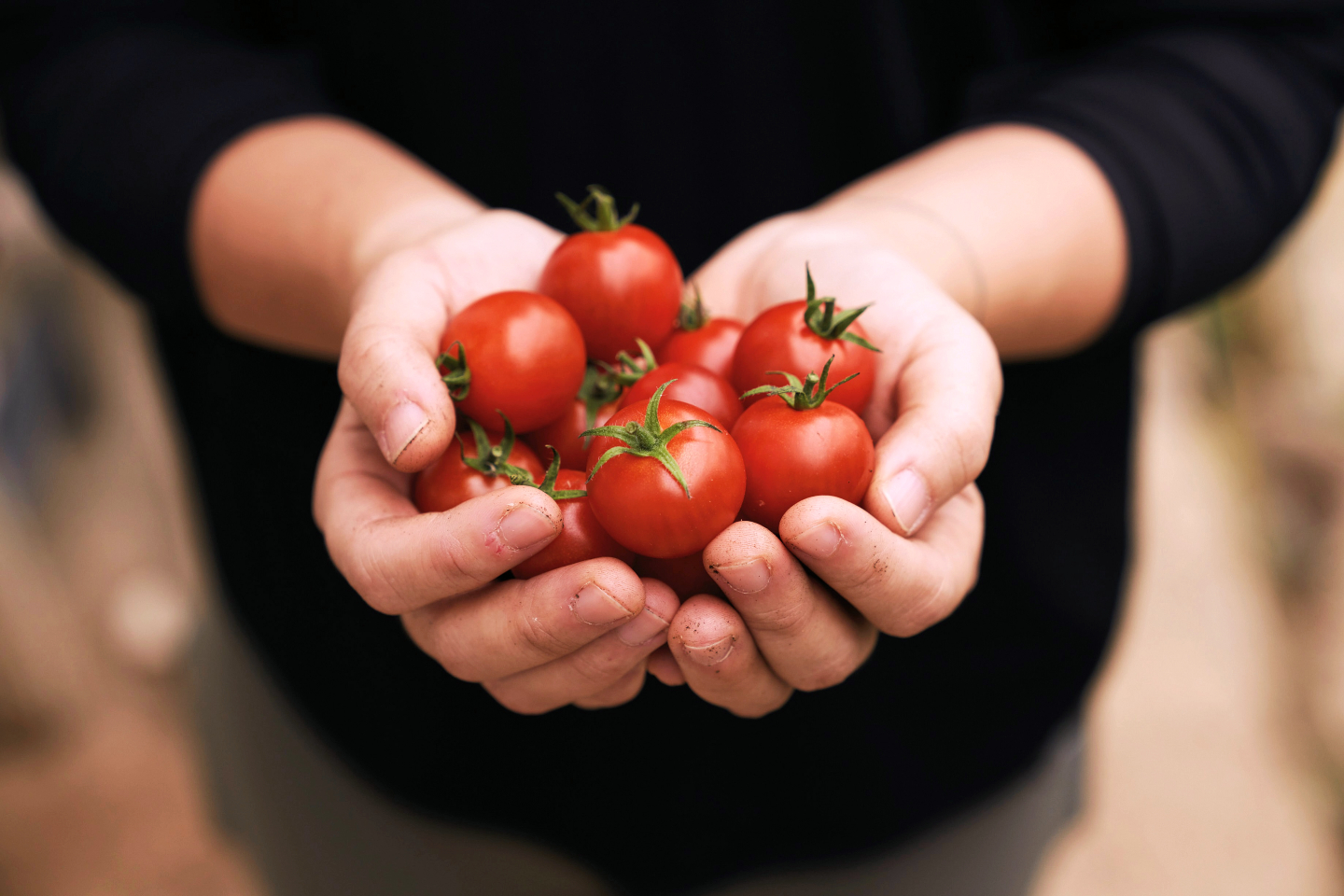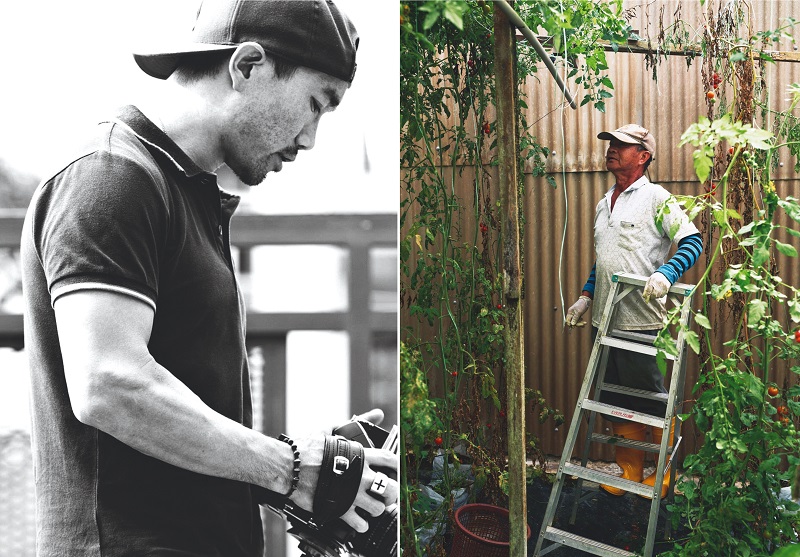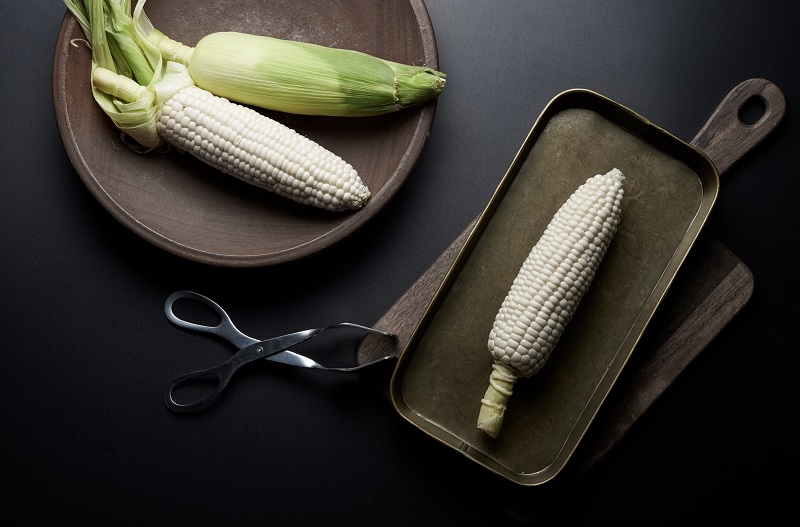
Sayo’s Super Sweet Cherry Tomatoes (All photos: Sayo Cameron Highlands)
Born and raised in Cameron Highlands, Pahang, Kim Mun grew up with a distaste for farm life. Watching his father work tirelessly, he knew from an early age that he did not want to take over the family farm. “When you imagine any type of farm life in Europe, or you grow up reading fairy tales, you probably admire that kind of lifestyle a lot. You probably think farm life is like one little house in the middle, cows with milk, and farmers growing things happily, laughing with their family. But commercial farming in Cameron Highlands is pretty miserable,” he says.
Kim Mun explains that fluctuations in the price of a farmer’s yield is the norm, which makes earning a consistent living very difficult. “Like, say, if you pluck tomatoes today, the wholesaler in Selayang, for example, will give you the price. But it is different every day. When you send the crop to the wholesaler, you won’t know the price immediately. You have to give it to them first and they will come back to you with a price depending on the demand that day. Let’s say yesterday, tomatoes were RM3 [per kg]; today they can be 90 sen or less.” This fluctuation is not felt by consumers because supermarkets stick to a fixed price either way, so it is only the farmers who lose out.
Today, Kim Mun is an experienced photographer with over 15 years of experience, specialising in glamour and fashion shoots. He has shot for magazine covers and many well-known luxury brands. “I always felt very lucky because, like, how many people get to do what they like and also earn a living from it?” he says. But when Covid-19 hit and the Movement Control Order (MCO) was imposed, Kim Mun found himself at a loss. “For the first 14 days, I was still optimistic, and thought, ‘Okay, wait at home lah, few days only’. How big an impact can it make? And then after the 14 days, there was another 14, and another and another. I started to realise this is not good, if we keep going [like this] we will have no more income. And I’m not the sort of person who can sit around and do nothing,” he explains.
sayo_1.jpg

Kim Mun began exploring his options and found himself turning to a friend. “The whole thing started with a conversation with one of my close friends, who owns a corn farm in Cameron Highlands. We needed to get her corn to people in Kuala Lumpur without their having to go to grocery stores. She had a logistics company that could transport the corn from her farm to the city and I could go get it from a pick-up location. We started with one box of corn, which I would distribute to customers,” he says.
Realising that there was a market for vegetables obtained directly from farms, Kim Mun expanded to other vegetables, and so Sayo Cameron Highlands was born. Now, he works with around 20 farmers in Cameron Highlands, including his father, who supply a colourful range of fresh vegetables and fruits — such as tomatoes, corn, asparagus, choy sum, avocado, baby spinach, grapes and strawberries — directly to consumers. By removing the middle man, Sayo is able to provide the freshest produce at reasonable prices for both farmers and customers. Sayo’s deliveries are not instant. “We tell you the soonest we can get you the crop, because we want to give you the freshest items in the best possible way, and at the most affordable price possible.”
As many of us are oblivious to the work behind growing and delivering these fresh fruits and vegetables, we tend to take the process for granted. People often comment about how farmers should adopt modern methods, be organic, create compost or be pesticide-free. Kim Mun notes that these people do not realise the high rents and fluctuating prices farmers have to deal with. Many modern methods — especially composting — can take years to develop and the yield is still not guaranteed. These farmers do not have the luxury of steady income to fund explorations of new methods. Being innovative without funding is often impossible.
sayo.jpg

“In the market, there are two main varieties [of tomatoes], heirloom and hybrid, which is also called F1. Most tomatoes from supermarkets are hybrids, which means they are bred with all the good genes. They have a hard, crunchy skin, and if you put them in the fridge, they can keep for a week. Even the colour stays very red,” Kim Mun says. The key difference between heirloom and hybrid tomatoes is that while the seeds from heirloom tomatoes can be dried and regrown, it is not possible to do the same with those from hybrids. These seeds can only be bought from suppliers. The heirloom variety also does not last as long and can be quite soft, which is why supermarkets do not often stock them. However, customers can now enjoy this flavourful variety, thanks to Sayo.
Customers are surprised by Sayo’s produce, especially items such as Grade A asparagus. “Markets like the one in Selayang don’t know how to sell premium vegetables like this, so, usually, the Cameron Highlands asparagus is exported to Singapore and Dubai. And the skinny asparagus we get in the supermarket is imported from Thailand. I thought, my goodness, I need to do something. That’s why I started Sayo — so that we get fresh crops from Cameron Highlands directly to local people,” Kim Mun says. Sayo sells unique varieties such as Kyoho grapes, white corn, kyuri (Japanese cucumber), and kabocha (Japanese pumpkin).
One of Kim Mun’s main motivations to keep Sayo going is that he is finally able to help his father, especially after watching him struggle for so long — he has been growing tomatoes for over 30 years.
“Our biggest achievement is the Sakura cherry tomatoes, which we call Sayo Super Sweet Cherry Tomato. Before this, in the whole of Malaysia, there was only one grower for this type of tomato — Chitose is a Japanese grower in Cameron Highlands,” he explains.
The shelf life of these cherry tomatoes is quite short, which is why local farmers have never grown them, but they are sweet, tasty and flavourful, says Kim Mun. He adds that Chitose is able to work directly with grocers, unlike the other local farmers. After he tried the Chitose tomatoes, Kim Mun decided to search for the seeds — which took a great deal of time and connections — and began growing them on his father’s farm. “Even when you get the seeds, there is no guarantee that the plants will grow. You cannot imagine how happy we were when we got our first batch of tomatoes.”
Kim Mun has a partner in IT who handles Sayo’s website, while he puts his photography skills to work to entice customers with beautiful images on its social media platforms. To stay eco-friendly, Sayo’s packaging uses minimal plastic. To eliminate as much waste as possible, it sells its unsold produce to What a Waste — a platform that channels extra food to marginalised communities.
Society perceives farming as a job that does not require education. “We didn’t grow up loving farming and our parents did not inspire us to be interested in it because they thought that farming is a low-grade occupation. People felt that farmers don’t need to study because they don’t need knowledge, they just need to be hardworking,” Kim Mun says. “In any other part of the world — you don’t need to go far, like in Taiwan — agriculture is booming because even during high school or university, people are encouraged to farm. There’s a lot of funding, a lot of grants that you can apply for, and the government actually supports young people to do all these things.”
Over the last year in Malaysia, people have begun urban farms and balcony gardens so they can become more self-sufficient. With the help of businesses such as Sayo, that farm-to-table lifestyle is made possible even for those who do not possess a green thumb or the space and time to grow their own food. We have a new appreciation for where our food comes from, and the hard work behind growing, harvesting and supplying this food. It is increasingly clear, and it is perhaps one of the greatest lessons of the pandemic, that agriculture is an unappreciated industry. It had been taken for granted, but these trying times prove how integral it is for our survival.
This article first appeared on Oct 11, 2021 in The Edge Malaysia.


